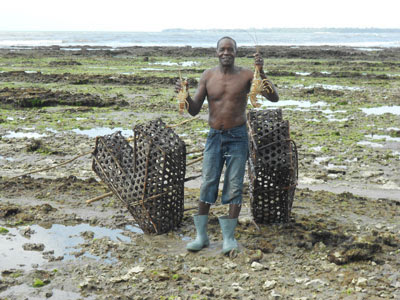Sunday October 14th
Another restful day today, so an opportunity to tell you
about the Tanzanian way of addressing people.
I knew from my time in Dar as Salaam last year with Cliff and Jane that
if you wanted to catch the ear of a waiter or waitress you called kaka
(brother) or dada (sister), but I didn't realise how ingrained the family terms
are into the culture. I found out the
first week when I asked Eva if she had cleaned my room and she replied that her
sister had done it. I won’t bore you
with the confusing conversation we had until eventually I established that
Vicky is not her real sister but a good friend can be referred to as
sister. I suppose in the same way that
brother can sometimes be used by Brits of Afro/Caribbean origins. In Tanzania it is really used extensively and
gives a whole new meaning to the term ‘extended family’.
Right; I understood. The problem now was what was I to be? I felt a little old to be calling the
youngsters dada and kaka so looked at the possibilities. If I was the father of our little family I
could be the ‘baba’, but for obvious reasons this did not appeal, so I looked at
the alternatives. I looked in my dictionary and found that the Swahili for
grandfather is ‘babu’ and that seemed to fit the bill, so now, to all and kind,
let me introduce Babu. It comes into a
lot of conversations. If a stranger
greets me, on my way to school, with ‘habari’ I can give the classic reply ‘nzuri’ and then qualify this by pointing up THE HILL
shaking my head sadly and saying ‘Babu’.
It’s amazing how quickly it caught on and how many friendly waves and
shouts of ‘babu’ I receive as I cycle along .
At least that is what I think they are shouting and I hope my poor
hearing has not missed the presence of a final ‘n’.
I finished what work had accumulated this morning and as it
was approaching low tide decided to have a walk on the beach. As I said in an earlier blog the YMCA is a
public right of way to the beach for the fishermen and by this I don’t mean the
sailors of dhows I mean the fishermen who work from the shore. The coast here has a very gentle slope. You can see from the picture below that is
taken some time before low tide that the high tide mark, that can be seen where
the sand changes colour just before the tree line, is not much higher.
By going at low tide it is possible to walk another 200m out
to sea without being out of your depth and this encourages two kinds of
fishermen. There are the ones who come
in pairs, both walk out to their depth and stretching a net between them, trawl
back to the shore, and there are the lobster fishermen, like the one below,
that peg their home made baskets out at one low tide and collect them at the
next. This gentleman was quite proud to
display his catch. of king prawns.
I’ve shown you the lounge/TV veranda and in the evening
there are usually a few people around having a drink or simply watching TV and
the local game of skill appears to be ‘draughtsi’ so last night I thought I
would chance my hand against Deo. One
problem to start was that nobody had told me the rules are different. They start off the same. You move the same; you capture the same (and
you must capture if possible); but as soon as you get a draughti to the other
side and it becomes a queeni it is a whole new ball-game. The queen can move diagonally all the way
across the board if you want and can jump anything on its diagonal. I’m glad we weren’t playing for money. Yet another thing to try to master over the
next two months.
Baadaye


No comments:
Post a Comment